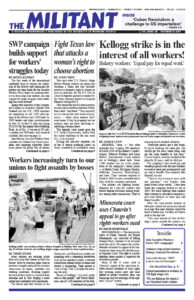MEMPHIS, Tenn. — Just after midnight Oct. 4 nearly 300 members of Local 252G of the Bakery, Confectionery, Tobacco Workers and Grain Millers International Union walked out at Kellogg’s plant here. Some 1,400 workers are on strike nationwide at the company’s cereal plants — in Battle Creek, Michigan; Omaha, Nebraska; Lancaster, Pennsylvania; and here. Their contract expired in October 2020 but was extended while talks with the company continued.
The strikers are fighting bosses’ demands for a two-tier contract that would deepen divisions among workers, among other concessions. They’re winning much-needed solidarity.
“Everyone should get a fair wage. If you’re working the same job, you should get the exact same thing, and get the same benefits in due time,” Carver Sumter, who has worked at the plant for 20 years, told the Militant.
The company’s two-tiered pay and benefit proposal calls for new workers to receive lower pay permanently and get worse benefits than someone like himself, he said.
“They’re also trying to mess with our pensions,” said Sumter, who preps Froot Loops cereal. “I was here when the company locked us out in 2014. We were fighting then against their attempt to introduce temporary, part-time workers at lower pay and fewer benefits.”
After the nine-month lockout in Memphis ended, the union was forced to accept that new workers would be hired at lower pay, but they still had a path to the top rate.
“This time around all four of Kellogg’s plants around the country are fighting together so we’re stronger,” he said.
Holding a handmade sign saying, “Honk for higher wages,” Paul Houston said he has been in the plant for only five months. He operates a machine that seals the cereal boxes. “This strike is important for me and for my family for the health care,” Houston said. “The company wants to pay us less and doesn’t want to pay for dental or vision insurance.
“My granddaddy was part of the 1968 sanitation workers strike carrying the sign ‘I Am A Man.’ He brought my daddy to that picket line, and now I’m bringing my sons to this picket line.” During that sanitation workers strike, which was a part of the broader working-class civil rights movement that brought down Jim Crow segregation, Martin Luther King Jr. was assassinated as he brought support to the workers.
Ten members of the United Auto Workers union from the General Motors plant here were on the Kellogg’s picket line while this worker-correspondent was there, as well as two unionists from UNITE HERE.
“We stand in solidarity with your fight for fair wages,” Glinder Louis, president of UAW Local 2406, told the strikers. The UAW workers explained that the Bakery Workers union supported their nationwide 40-day strike in 2019, walking the picket lines, and now they were doing the same. “Showing support is so important,” UAW Local 2406 shop chairman Ron Conley said. “What the unions are able to win benefits everyone.”
BCTGM Local 252G Vice President Kevin Bradshaw pointed to some of the support their fight is winning. He said that on Oct. 6 representatives of the Southern Christian Leadership Conference and other Black ministers held a press conference backing the strike.
The company put out a statement claiming that in 2020 average earnings for the majority of Kellogg’s employees was $120,000. But that was at the height of the pandemic, when workers had to work seven days a week, 12 to 16 hours a day. “So they don’t tell you that’s overtime,” Bradshaw said.
Pickets are up around the clock. So far, strikers said, the company hasn’t tried to bring in replacement workers like they did during the lockout.
Kellogg’s reported global sales of $3.6 billion in the last quarter and profits of some $380 million.
Michigan strikers fighting two tiers, cuts to COLA, vacation
BY DON FISHER
BATTLE CREEK, Mich. — “When you work for Kellogg’s, you work eight days a week,” said Bill Few, a Kellogg’s worker on strike here, describing the company’s forced overtime policy to this Militant worker-correspondent on the picket line Oct. 8. “And you work eight hours per day and hope not more.” Few has worked here for 16 years.
Union members organized by BCTGM Local 3G went on strike at the company’s flagship plant at midnight Oct. 4, keeping up picket lines at three gates plus one railroad crossing.
“We are fighting for future generations by trying to get rid of the two-tier,” said Sonia Hughes, who has worked at the plant for 15 years. “I am thankful for the strike in 1972 that won the gains we have today.”
“The company wants new hires not to get full benefits nor the full pension,” said Mike Cramutolo. “In our old contract we got cost-of-living adjustments, a maximum of $1.80 per contract. Kellogg’s wants to get rid of that. The company’s proposal is to use vacation instead of Family and Medical Leave,” a federal program that entitles workers unpaid, job-protected leave for family or medical reasons.
“An agency has recruited scabs who enter on buses with police escorts,” Cramutolo said. “Canadian National Railway workers are honoring our picket line.”
“The long hours we are forced to work break up marriages,” said Cherry Crockett, who brought her music to the lively picket line. “We didn’t know our kids, and it interferes with our religious practices.”
Omaha: ‘Longtime and newer workers are standing together’
BY EDWIN FRUIT
OMAHA, Neb. — Striking members of BCTGM Local 50G are staffing six gates at Kellogg’s plant here. Workers are on the picket lines 24 hours a day, each person taking four-hour shifts.
“We’ve been working six and seven 12-hour shifts ever since the pandemic,” said Allan Grzebielski, a 17-year veteran at the plant. Five hundred union workers are at the plant here, he said, but only 350 are full time and 135 are hired as “transitionaries.” He said the turnover rate for the newer workers is around 66%. “People can find other jobs without such a grueling schedule.”
“We are not asking for more wages or benefits,” said Brian Akins. “We want the transitionary workers to be on parity with us.” They make $10 less an hour and are not entitled to benefits. It can take up to six years for a transitory worker to become permanent. The current union contract calls for a cap of new workers at 30%, strikers say. The company wants no limit on the number of workers it hires on these conditions.
“The old timers fought for everything we have today,” Grzebielski said. “We’re doing the same for new workers. If the company gets its way, pensions and benefits will disappear and the wage rate will fall as well. They are basically trying to break the union.”
Parker Nicholls, a 26-year-old construction worker, and Joe Swanson, a retired railroad worker and a member of the SMART-TD union, both came to the picket line from Lincoln to show their support. “This is my first picket line,” Nicholls said. “I am very impressed with the solidarity between the long-standing and newer workers.”
Striking workers reported they had received food, water and other support from the Carpenters, Pipefitters, SMART-TD and United Steelworkers unions.
Organize solidarity with Kellogg’s strikers, whose fight is in the interests of the entire working class! The union’s national website — bctgm.org — has a “Support Kellogg’s Workers” page with ways to send support messages and donations to each of the locals on strike.


